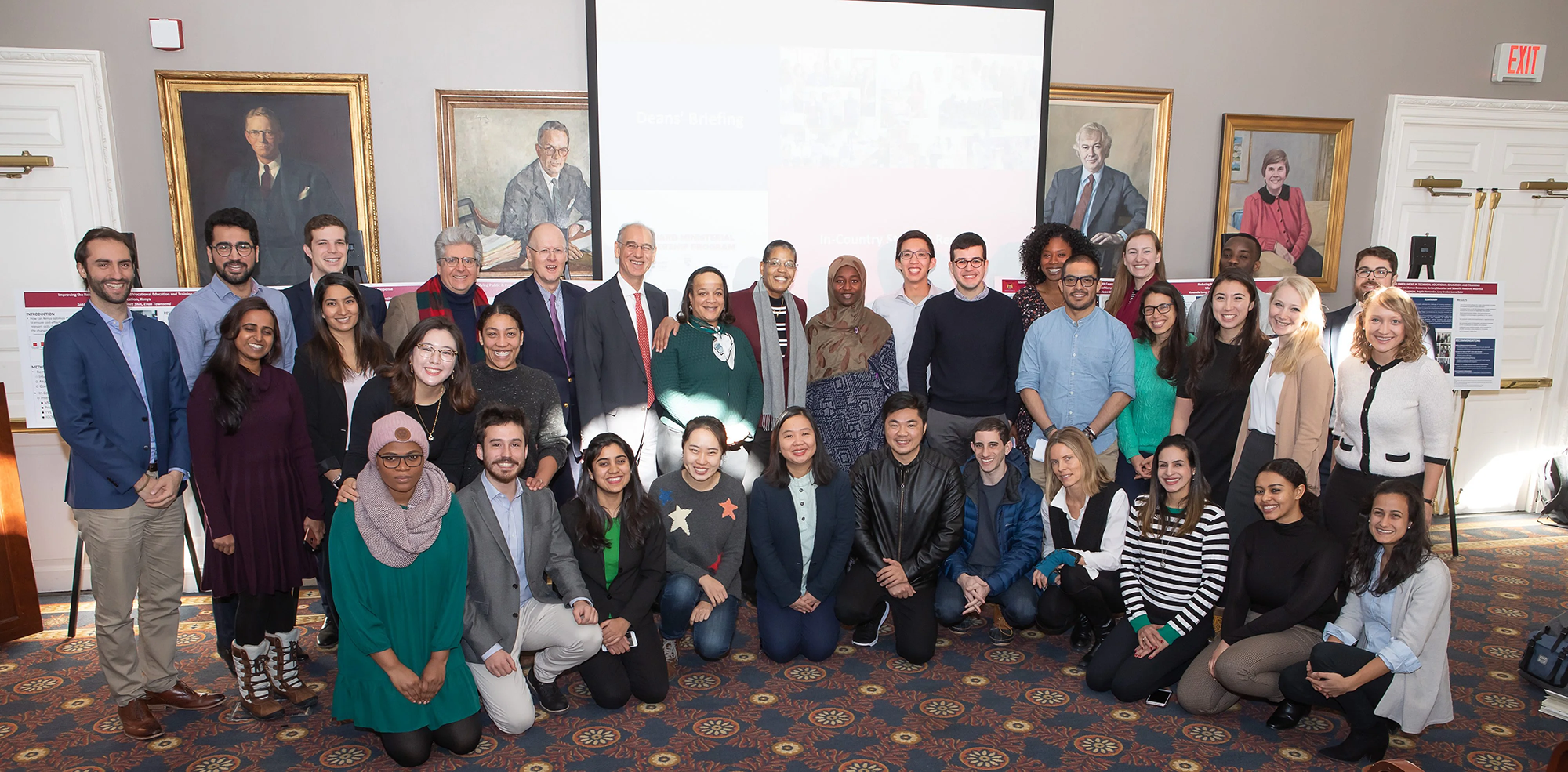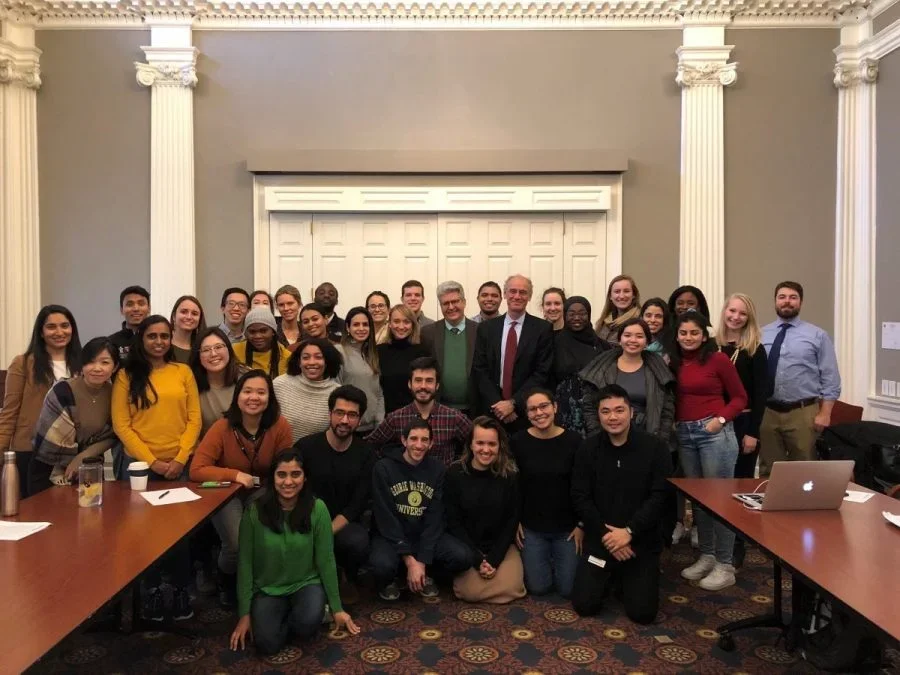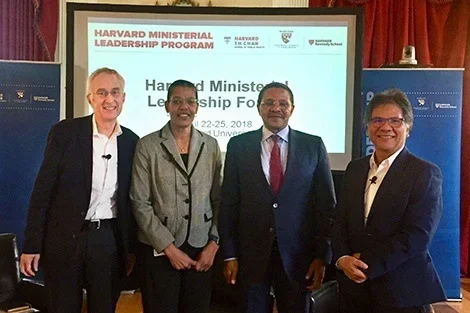Baroness Valerie Amos, Director of School of Oriental & African Studies at the University of London, has been appointed to the Advisory Board of the Harvard Ministerial Leadership Program. Valerie Amos served as Secretary of State for International Development in the administration of UK Prime Minister, Tony Blair. In 1997, she was elevated to the British House of Lords and appointed Leader in 2003. Between 2009 and 2010, she served as UK High Commissioner to Australia. In 2010, Baroness Amos was appointed the eighth United Nations Undersecretary General for Humanitarian Affairs and Emergency Relief Coordinator. She has also held numerous other public sector roles including Chief Executive of the Equal Opportunities Commission and adviser to the Mandela Government on leadership and change management issues. Baroness Amos is co-founder and Patron of the Amos Bursary, which promotes higher education opportunities for young men of African and Caribbean heritage in the UK.
 bdugan
bdugan
Harvard Students Undertake High-level Policy Research for Government Ministers in Africa
In January 2019, 40 students from the Harvard T.H. Chan School of Public Health (HSPH) and the Harvard Graduate School of Education (HGSE) worked in seven countries across Africa in support of health and education ministers in those countries who are part of the Harvard Ministerial Leadership Program. Students were charged with in-country policy-focused research to help inform implementation of the Ministers’ priority policy goals developed during their time at Harvard in June 2018. In March, participating students provided an in-person report-back to Chan School Dean Michelle Williams and HGSE Dean Bridget Long.
Through presentations and posters, students shared the results of their research, which included developing a tool for teachers’ performance evaluation in Côte D’Ivoire, exploring the feasibility of mobilizing more resources from universal health insurance premiums in Kenya, conducting a landscape analysis of existing health centers in Lesotho, and making recommendations for how to increase student enrollment in technical and vocational education and training in Mauritius. In addition to briefing Dean Williams and Long on the substance of their policy research, students attested to the unique experiential value of working directly with high-level government officials and contributing to priority issues these governments are dealing with.
Spurring Economic Growth through Human Development Investment
Current and former finance and economic planning ministers from 20 countries participated in the seventh annual Harvard Ministerial Forum at Harvard last week. A key focus of the Forum was groundbreaking new research from David Bloom, Clarence James Gamble Professor of Economics and Demography at Harvard’s T.H. Chan School of Public Health, correlating economic returns from human development investments. [link to David’s paper] Bloom found that highest returns result from reductions in fertility; increased life span resulting from better health care and more healthy living; and increased educational attainment.
Participating ministers were challenged to consider whether their current budget spending is building a foundation for sustainable economic growth. For example, health and education account for the largest part of most countries’ budgets, but in many developing countries health and education outcomes are poor. One result is substantial and growing numbers of unemployed young people. Another is population increase continuing to outpace GDP growth. Ministers mapped a human development pathway for each of their countries focusing on the key human development building blocks with highest long-term economic benefits such as early childhood nutrition and educational development, better quality primary school education, access to comprehensive reproductive health services, and strengthening primary health care.
What makes an effective minister?
The role of ministers of education and health is pivotal to developing the human capital essential for sustainable economic development. These sectors together usually account for the lion’s share of the national budget, they are often the largest employers, and they provide critical frontline public services. Yet the global commitment to universal education and health … Read more
Harvard Ministerial Program Supports Student Research
On January 2nd, 2019, 39 graduate students from Harvard T.H. Chan School of Public Health and Harvard Graduate School of Education will board planes and fly off to conduct unique research projects with ministries of health and education across Africa.
As part of its post-Harvard support, the Harvard Ministerial Leadership Program offers Program alumni the opportunity to present research proposals that can support the achievement of their legacy goals. The Program matches each proposal to a set of talented Harvard graduate students, and together with support from Professors Rifat Atun and Fernando Reimers, the students are well equipped to conduct rigorous research that can drive policy decisions.
Harvard Ministers Work on Innovative Ideas for Youth Development
Over three days in late November about 25 currently serving government Ministers from across Africa gathered in Johannesburg, together with a similar number of selected young African achievers, to jointly develop new approaches to current high-levels of youth unemployment across Africa and to explore possibilities for optimizing the prospects of a demographic dividend.
Ministers, including finance, economic planning, education, health and youth had all participated in Ministerial Forums at Harvard over the past three years and continue to benefit from the post-Harvard support that is a key part of the Harvard Ministerial Leadership Program.
The Harvard Ministerial Roundtable for Policy Innovation in Human Capital Development in Johannesburg extended the on-going peer-networking among ministers participating in the Harvard Ministerial Leadership Program to include for the first time a cross-section of young African achievers from diverse backgrounds in discussions about optimizing Africa’s human capital.
Call for Student Rapporteurs – Powering Up: Ministerial Roundtable for Human Development Policy Innovation
The Harvard Ministerial Leadership Program is calling for applications of Harvard graduate students to contribute substantively to Powering Up: A Ministerial Roundtable for Human Development Policy Innovation to be held in Johannesburg, South Africa toward the end of November 2018.
Be ‘Remarkable’ Kenyan First Lady Exhorts Harvard Forum Participants
Speaking to participants in the seventh annual Harvard Ministerial Leadership Forum in early June, Margaret Kenyatta, First Lady of Kenya, outlined the impressive results of her groundbreaking Beyond Zero campaign: In Kenya, over the past five years, infant mortality has fallen from 52 per 1,000 to 39 per 1,000 live births; under five mortality came down from 74 per 1,000 to 52 per 1,000. Maternal mortality dropped from 488 per 100,000 to 362 per 1,000.
Prioritizing Budgets for Social Impact
Finance and economic development ministers from nations in Africa, Latin America, and Southeast Asia recently gathered at Harvard for the annual Harvard Ministerial Leadership Forum, an intensive four-day program focused on ways that they can use their positions to accomplish policy and investment goals in human development. This year’s program featured a talk moderated by … Read more
From Classroom to Country: Harvard Students Working with Health and Education Ministers
Last January, Marisa Steinmetz and Allison Casey, two students from the Harvard Graduate School of Education landed in the Republic of Madagascar with a mission from the Ministry of Education: to understand teacher absenteeism and identify possible solutions to this problem.









